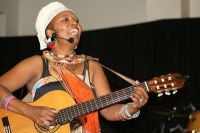March 8, 2008 – Women from business, NGOs and government met on International Women’s Day under the auspices of the departments of trade and industry and arts and culture, to discuss empowerment of women and ways of fighting against poverty.
The meeting was held at the Presidential Guesthouse in Pretoria, and was opened last night by South African Deputy President Phumzile Mlambo-Ngcuka. Guest speakers including government representatives and community leaders addressed an audience of a few hundred women – and a few men – who later broke away into discussion groups, where they were able to make individual inputs.
Topics ranged from the importance of arts and culture and environmental projects in uplifting women, to the global nature of discrimination against women. Community craftswomen displayed their wares in a marquee attached to the function room.
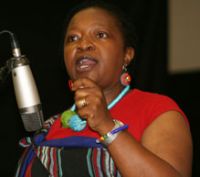
Nelson Mandela Children’s Fund CEO Sibongile Mkhabela.
(Image: Nelson Mandela Foundation)In her introduction to the event, Nelson Mandela Children’s Fund CEO and MC for the day, Sibongile Mkhabela, told the audience, “We need to get rid of the schizophrenia. The same woman who sits in the boardroom is also a mother. This is the platform where we can say, ‘I want to be the same person; I don’t want to be different people.’ The same women who are in the stokvels [collective savings clubs] are the women drafting policies,” argued Mkhabela. “We need to begin a oneness of experience and existence.”
The first speaker at the event, Nicola Danby, CEO of Business and Arts South Africa (BASA), used her own story of financial and personal empowerment to inspire.
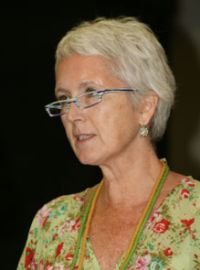
CEO of Business and Arts South Africa, Nicola Danby.
(Image: Nelson Mandela Foundation)Returning to South Africa from Canada as a divorced housewife with two young children, Danby realised the challenges she faced as a single woman trying to earn a living. “I could not open a bank account as I had no husband … as a single woman I couldn’t get a job because I was considered a risk. I had to learn to respect my abilities, respect myself and get other people to respect me.” Danby did different jobs including selling advertising space in telephone directories and typing, before becoming involved in arts and culture development projects. But she said she would always respect women who didn’t work formally: “You’re a powerhouse – not ‘just a housewife’,” she said.
BASA is a joint initiative of government and the business sector that encourages business to invest in the development of South Africa’s arts industry. BASA has had success with projects such as the FNB Dance Umbrella. Danby spoke of the investment companies such as Discovery Health, MTN and BHB Billiton had made in South African arts. “[These projects] are a fundamental part of building civil society and of building a shared future.”
Women are at the core of this shared future: “I know women are warriors … it’s true that the hand that rocks the cradle, rules the world. We make our future!”
Community leader and businesswoman Agnes Qwabe told an inspirational story about a group of women who started a bakery and then a bank in the village of Mathabatha in Limpopo Province (See related story, Rural businesswoman inspires success in others.)
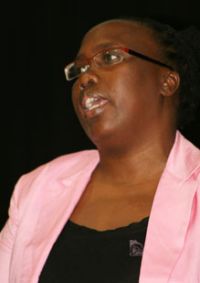
Chief director in the Department of Arts and Culture, Dr Fikila Dilika.
(Image: Nelson Mandela Foundation)Fikile Dilika, chief director in the Department of Arts and Culture, spoke about the role that arts and culture can play in creating jobs and eradicating poverty. Introducing herself, Dilika said, “I grew up in a scientific environment, but decided to move away from the labs and the test-tubes. She said that arts and culture have potential to empower people who are unemployed, particularly women and the youth, though there were challenges including funding constraints. She called on everyone in the room “to adopt someone to develop” in the context within which they work, and assured those present that South Africa would meet the Millennium Development Goals of halving unemployment and poverty by 2014.
The Department of Water Affairs and Forestry’s Mandisa Mangqalaza speaks about the role of the department’s Work for Water project in empowering women
Mandisa Mangqalaza, general manager of the Working for Water (WfW) programme, explained ways in which this innovative programme had created both economic and personal empowerment opportunities. The WfW programme is run by the Department of Water Affairs and Forestry and focuses on clearing invasive plants to re-open water supplies that have been lost to these alien plants.
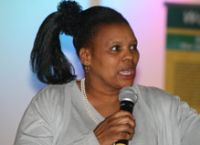
The programme employs people primarily to clear trees, but numerous additional jobs have sprung up in which people make use of the cleared wood. Entrepreneurial individuals have used the wood to create eco-coffins, indoor and outdoor furniture, garden furniture and other functional and decorative items. Mangqalaza is particularly proud of how the programme has introduced women into a traditionally male environment. “Women are capable of making a difference, of making a change,” she said.
United Nations Development Programme representative, Christine Musisi, provided a global perspective on the challenges facing women. She pointed out that of the 1,2 billion people living in absolute poverty, 70% of them are women, and that “the feminisation of poverty is a growing phenomenon”. But, she added, “The importance of gender equality in eradicating poverty is now recognised. … If development is not engendered, it is endangered.”
She said that while gender disparities persist in all areas of human development and women make up two-thirds of the world’s poorest people, there had been some advances. Rwanda had the most representative leadership in the world in terms of gender, she said, with 48% of parliamentary members being women. Globally, women’s representation in government had risen slowly. In 1945, only 3% of political leaders were women, while by 1985, this had increased to 12%. In 2006, the figure was about 16%
“Women’s leadership is not only a human right, but a necessity,” Musisi said.
Reflections
Mothomang Diaho, head of the Dialogue Programme at the Nelson Mandela Foundation, said she particularly enjoyed the day because “The focus was on achievement; it was more forward-looking as opposed to bemoaning the problems which we know face women. The futuristic, positive outlook was very inspiring.”
“We are going to carry this work through in our Dialogue Programme, particularly through the Malibongwe Dialogue Series, which focuses on empowering women,” said Diaho. “It is through empowering women that we can empower families, and ultimately communities.” The first Malibongwe Dialogue was held between four women who had been involved in the struggle against apartheid and an invited audience at the Foundation on May 30, 2007. Read more about this event here. A booklet was subsequently produced, and is available in printed format from the Foundation.
Biographies
Sibongile Mkhabela
Sibongile Mkabela of the Nelson Mandela Children’s Fund said, “100 years later, we haven’t moved much; it shouldn’t happen again. We’re going to put the next generation of women on a different platform all together. But there’s a lot to do – I’ve never seen the women’s movement as frail as it is now. We need to find each other again.”
Connie Mashaba
Connie Mashaba, from hair care and cosmetics company Black Like Me, said, “It’s high time we women were emancipated and did things for ourselves. But we also need the help of those who have done it before, to hold our hands and help us.”
Charles Musimiki
One of the few men in attendance, Charles Musimiki from the Self Help Skills Training Centre in Pretoria, said he had gained invaluable information from the event that he could take back to people at grassroots level. “People are disadvantaged not because systems aren’t in place, but because they don’t know how to access the systems.”
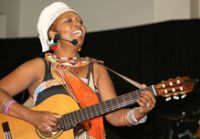
Singer, composer, lyricist and guitarist Tu Nokwe entertains dialogue participants.
(Image: Nelson Mandela Foundation)Pulen Makhaele
Representative of the Joint Women’s National Central Development Co-operation, Pulen Makhaele, said the event had helped her understand where to go for government support.
Hayley Berman
Hayley Berman of the Art Therapy Centre in Rosebank, which trains people in art counselling and provides them with art-based therapy resources, said she appreciated the way the event had provided clarity. “We are here to see what government’s objectives are and if they’re in line with what we’re trying to achieve. There is a lot of synergy on issues of self-empowerment and sustainability, particularly how we make sure the people we’re training can reach children and youth in the community after they leave us.”
Fikile Dilika
Fikile Dilika, chief director in the Department of Arts and Culture, said, “It’s encouraging to get into a culture of dialogue as women. This generation has lost its inter-connectedness. We need to regain it right now!”
For more on how International Women's Day is celebrated around the world, and a historical look at this day, visit the United Nations' page dedicated to this issue on its website.
